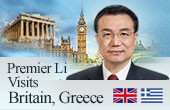
Italian business leaders await Li with open arms
Comments Print Mail Large Medium SmallPremier's arrival expected to provide fillip to industrial, economic and cultural collaboration
Premier Li Keqiang's visit to Italy is being eagerly awaited by the country's business elite, who hope his four days there will help pave the way for further bilateral trade and investment activities.
Li is due to meet top Italian business figures in Rome, then speak at a forum in Milan during his trip, after visiting Germany and Russia.
Massimo D'Aiuto, the general manager of SIMEST, a financial institution that helps promote Italian enterprises abroad, hopes that top of the agenda for the leaders of both sides will be to cut red tape to allow further penetration of each other's markets.
Italian firms rely on a worldwide reputation of quality, innovation and elegance, he says.
"In fact, Italy is a leader in the production of many top consumer goods, and China is obviously a very important audience for us," D'Aiuto says.
He views China as a growing, wealthy market with a young population whose tastes are constantly changing, and where quality is becoming an increasingly important issue.
He adds that Italy is a leader, too, in areas such as mechanics and technology, construction, and the environment - sectors that offer huge opportunities for industrial cooperation between the two nations.
Despite the Chinese economic slowdown and other pressures, he says, China continues to be a vital strategic market for many Italian companies.
"China is often the first target destination for Italian investments," he says. "Since the start of our operations in 1991 we have approved 204 investment projects in China, worth some 111 million euros ($140 million)."
However, despite a significant rise in Italian interest in China, both in number and amount, he says Italian companies, particularly small- and medium-sized enterprises, can still be skeptical about making the move there, scared off by issues such as language, culture and completely different economic and regulatory structures.
To support such Italian companies, SIMEST and some of the country's financial services organizations offer advisory, technical and financial assistance services to companies planning to do business with China.
"We also undertake research aimed at identifying the best investment opportunities for Italian companies as well as the most suitable sites to base their business," D'Aiuto says.
He highlights a number of sectors offering the best opportunities to Italian firms: biotech, IT, new energy, environment protection, alternative fuels, new materials and high-end manufacturing.
Emma Marcegaglia, chairman of oil major Eni, Italy's biggest listed company, meanwhile, thinks Li's visit could mark a significant moment in the ongoing investment agreement negotiations between China and the EU, launched last year.
"We very much hope that an ambitious agreement can be reached, covering both investor protection and new market opportunities for European goods and service providers in China," she says.
Furthermore, to guarantee the agreement's effectiveness, Marcegaglia is calling for the inclusion of relevant enforcement mechanisms, such as an investor-to-state dispute settlement - a legal requirement that grants foreign investors the right to initiate dispute settlement proceedings against a foreign government.
Italy now holds the presidency of the Council of the European Union, hence its hosting of the 10th ASEM summit, and Marcegaglia says she "strongly supports" the European Commission in its negotiations with China.
Diana Bracco, president of Milan Expo 2015 and chairman and managing director of the Bracco Group, the healthcare multinational, says that cultural dialogue, too, between China and Italy is stronger than ever.
In 2010 she established the Bracco Foundation, which is involved in the field of arts research and education promoting national cultural, historical and artistic heritage.
"Shanghai Expo amazed me in many ways, therefore Expo 2015 will be a testing challenge for Milan and Italy," she says, adding that she expects a million tourists from China to attend next year's event.
China will be among the most important participants in Expo 2015, which she hopes will offer an opportunity to learn more about her country's culture and its contribution to sustainable development for future generations.
Liu Jia contributed to the story.
(China Daily European Weekly?10/10/2014 page10)
Background






